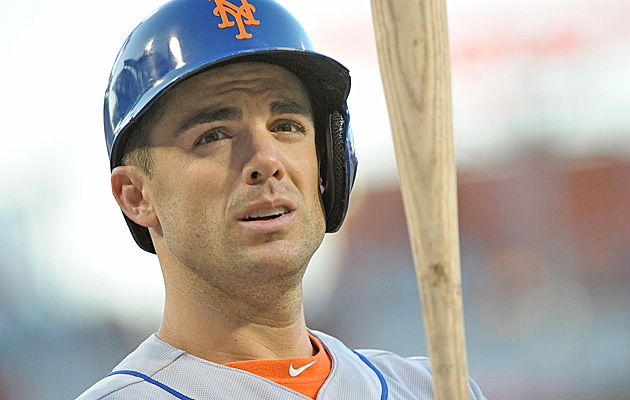 |
| Wright is having a typical year, hitting .317 with 17 homers. (US Presswire) |
MIAMI – In just another month, another Mets season featuring the usual few months of hope followed by a sad second-half downturn will mercifully end. And then begins the real important time for the Mets’ future, specifically the small window for them to reach a long-term deal with David Wright, the beloved homegrown star who a high-ranking Mets person once called “our Jeter.’’
Wright told the Mets he didn’t want to negotiate during this season, at least delaying their hope to make him a Met for life, and he said in an interview this weekend that that goes for next season, as well. That leaves this winter as the time to get it done.
Based on the surprisingly flattering words he had about the second-division-dwelling Mets, it’s up to the team. There are no excuses.
The verbiage and feeling all still point to this getting done. And, as Jose Reyes, a noted expert in this very situation, opined regarding Wright, “I hope they keep him. He’s the face of the franchise.’’
For that very reason (and a few others), it’s hard to see Wright – who’s having a typical year with 17 home runs, 78 RBI and a .317 batting average -- leaving. Reyes, who signed for $106 million for six years with the rival Marlins, you could easily see going.
Some Mets officials privately wondered whether Reyes could stay healthy. About Wright you never hear a peep that could be construed as negative, not since New Yorker writer Jeffrey Toobin caught Mets owner Fred Wilpon in a weak moment at a time when he was wondering whether the Madoff scandal might take his beloved team and contested the widely-held belief that Wright is a “superstar.’’
Even from Wright, who may be more media savvy than the Mets’ longtime owner, you hear only positive (and you know he’s seen it all with the Mets, not all of it good). Speaking of his chances to remain a Met long-term, Wright doesn’t even give a nod to the negotiating thing most of them do.
“I’m extremely optimistic,’’ he said. “I’ve really enjoyed it here.’’
Time for the Wilpons to show how much they've enjoyed having him here, for showing the guts to play soon after suffering a serious concussion (he wanted not to miss a day before being convinced to go on the disabled list), for showing the fortitude to play through a broken back last year (he should have been told to rest), for enduring the stark pitchers' park they built (the team finally fixed that last winter) and for keeping a positive attitude even when things are falling apart around him.
Time for the Wilpons to pony up. The figure of $160 million for eight years would be a nice start (my suggestion, not Wrights; he's too polite to talk about loot).
The annual losing, of course, bothers Wright. But apparently not enough to break him.
In the face of a fourth straight losing season, he also remains optimistic about the team’s long-term chances, saying, “Although we haven’t gotten things completely turned around, we’ve taken small steps in the right direction and have something to build on.’’
Of course, no signing is guaranteed for an organization whose biggest single player expenditure in the last two years was for offbeat middling closer Frank Francisco, who signed for $12 million over two years, an organization that’s cut its player payroll from $140 million to $95 million, an organization whose greatest non-Madoff regret was giving $66 million for four years to Jason Bay. The Francisco contract will be topped when the Mets pick up Wright’s $16-million option for 2013, but that never was in question. The question is if it ends there.
There have been some media suggestions the Mets should consider passing on their one longtime star, look to deal their one tradable high-priced veteran and get on with a rebuild. However, the Wilpons don’t believe they can embrace such a long-term stance in New York and sources continue to say they intend to try to sign Wright long-term instead. Rival execs suggest Wright is likely a $20-million player, and yet Mets ownership, aware of this probability, seems undeterred.
What’s more, Wright’s interest in staying seems just as great as the team’s in keeping him. None of the negativity seems to have swayed Wright, not the string of second-half collapses, not the severely reduced payroll, not even the misguided Fred Wilpon remark.
“I like to think I’m a loyal person,’’ Wright said.
Just how loyal is Wright? Well, for one, Wright said he is sticking with his embattled agents, the Levinson brothers, who are being investigated by MLB and the players union for representation of Melky Cabrera and possible ties to Kirk Radomski.)
But more to the point, after nine years as a Met, now a majority suffered in the second division (barring a huge finish, this will be the fifth year out of nine with a losing record), he couldn’t summon one bad word about the Metropolitans.
“There’s not a single complaint that I have,’’ Wright said. “(The Mets) drafted me as a kid. They developed me. They’ve given me an opportunity to make a living playing a game. There’s a tremendous amount of mutual respect. They’ve gone above and beyond.’’
That doesn’t sound like a man on the way out, now does it?
Perhaps taking a lesson from Jeter eight miles away, Wright has expertly guided the minefields of New York, and that includes his handling of the negotiations so far. Wright short-circuited the Mets’ intentions to try to negotiate an extension during this season, saying he didn’t want to be distracted while recalling how distracted he was when he agreed to his $68-million extension early in the 2006 season. Wright still maintains he did it to eliminate the distraction, but a side benefit has been to see the baseline likely go from friend and fellow Virginian Ryan Zimmerman’s $100-million, six-year deal to $140 million for seven.
Eight years for $160 million would seem like a reasonable bid for Wright, though if he desires more years it’s hard to see how they pass now. They need credibility, their anchor, their Jeter.
They also can’t afford to give up the RBI. Their greatest need going into 2013 is more power, not less.
Rather than swallow him up, New York has been a plus for Wright. By all accounts, he loved his eight-year tenure, living in Manhattan while taking advantages of the pluses it offers. But at his heart, he is a ballplayer who knows history.
Wanting to stay a Met is about loyalty. And it’s a bit about legacy, too.
Wright grew up in southern Virginia, not far from where the Mets Triple-A team was stationed for years in Tidewater/Norfolk. But the real influence was three and a half hours away, where he saw his first major-league game as a kid, sitting in the cheap seats at the then-brand-new Camden Yards.
“My favorite player was Cal Ripken,’’ Wright said. ‘”The biggest reason for that was, I like that he stayed.’’
Hard to see Wright going. And easy to see him giving the Mets every chance.
Wright is, of course, too polite to talk about dollars, or even years.
But he did say about the coming contract, “You’d like it to take you to the end of your career.’’
Based on his words, it’s hard to imagine his career ends anywhere else. The smart money he stays the king of Queens, and yes, the face of the franchise.

















